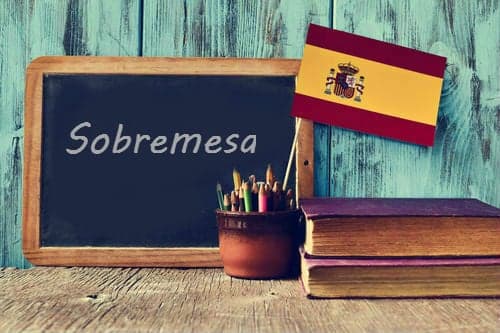Spanish Word of the Day: 'Sobremesa'

This isn't just a word you need to learn in Spain, it's an entire concept.
Today we delve into a rather interesting cultural phenomenon in Spain: the sobremesa.
What does sobremesa mean?
Sobremesa literally means over the table, but in Spanish it's used to refer to the period after a meal when you chat with friends or family and enjoy each other's company. It can even refer to business associates, where you engage in post-lunch conversations or meetings. Let's look at an example:
-
Cada sábado tenemos una sobremesa con la familia.
Every Saturday after lunch we sit around and chat as a family.
You'll often notice that in restaurants in Spain, the waiters will leave you to it after a meal and would never bring the bill after your meal without being asked.
It's common to have a lengthy sobremesa at the weekend but due to the Spanish working schedule usually including a long lunch break (sometimes up to two hours), it is also something we see at restaurants and in Spanish homes throughout the week too.
 Photo: monkeybusiness/Depositphotos
Photo: monkeybusiness/Depositphotos
Sobremesa also means tablecloth (which is also called 'mantel')
-
La sobremesa esta sucia.
The tablecloth is dirty.
Check out our other word of the day posts
This word of the day has been contributed by LAE Madrid, the leading Spanish academy in Madrid. Accredited by the Insitituto Cervantes, it offers Spanish courses for all levels and also has Spanish classes for kids and families. Read their blog for more Spanish!
READ ALSO: Ten things NEVER to do when dining in Spain
Comments
See Also
Today we delve into a rather interesting cultural phenomenon in Spain: the sobremesa.
What does sobremesa mean?
Sobremesa literally means over the table, but in Spanish it's used to refer to the period after a meal when you chat with friends or family and enjoy each other's company. It can even refer to business associates, where you engage in post-lunch conversations or meetings. Let's look at an example:
- Cada sábado tenemos una sobremesa con la familia.
Every Saturday after lunch we sit around and chat as a family.
You'll often notice that in restaurants in Spain, the waiters will leave you to it after a meal and would never bring the bill after your meal without being asked.
It's common to have a lengthy sobremesa at the weekend but due to the Spanish working schedule usually including a long lunch break (sometimes up to two hours), it is also something we see at restaurants and in Spanish homes throughout the week too.

Sobremesa also means tablecloth (which is also called 'mantel')
- La sobremesa esta sucia.
The tablecloth is dirty.
Check out our other word of the day posts
This word of the day has been contributed by LAE Madrid, the leading Spanish academy in Madrid. Accredited by the Insitituto Cervantes, it offers Spanish courses for all levels and also has Spanish classes for kids and families. Read their blog for more Spanish!
READ ALSO: Ten things NEVER to do when dining in Spain
Join the conversation in our comments section below. Share your own views and experience and if you have a question or suggestion for our journalists then email us at [email protected].
Please keep comments civil, constructive and on topic – and make sure to read our terms of use before getting involved.
Please log in here to leave a comment.